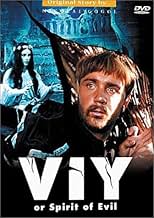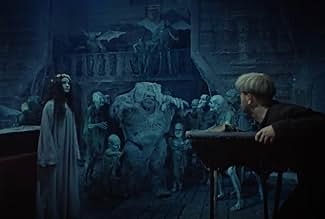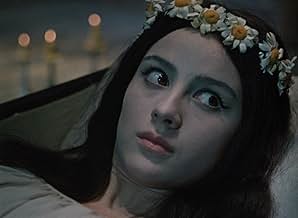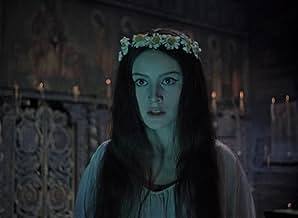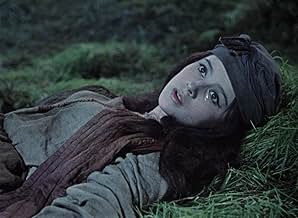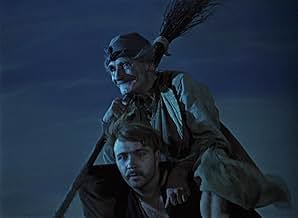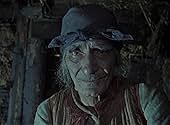IMDb-BEWERTUNG
7,2/10
10.772
IHRE BEWERTUNG
Ein junger Priester wird beauftragt, die Totenwache für eine Hexe in der kleinen alten Holzkirche eines abgelegenen Dorfes zu halten. Dies bedeutet, drei Nächte allein mit der Leiche zu verb... Alles lesenEin junger Priester wird beauftragt, die Totenwache für eine Hexe in der kleinen alten Holzkirche eines abgelegenen Dorfes zu halten. Dies bedeutet, drei Nächte allein mit der Leiche zu verbringen - mit seinem Glauben als einzigem Schutz.Ein junger Priester wird beauftragt, die Totenwache für eine Hexe in der kleinen alten Holzkirche eines abgelegenen Dorfes zu halten. Dies bedeutet, drei Nächte allein mit der Leiche zu verbringen - mit seinem Glauben als einzigem Schutz.
Natalya Varley
- Pannochka
- (as N. Varley)
Aleksey Glazyrin
- Sotnik
- (as A. Glazyrin)
Nikolay Kutuzov
- Witch
- (as N. Kutuzov)
Vadim Zakharchenko
- Khalyava
- (as V. Zakharchenko)
Pyotr Vesklyarov
- Prncipal of the Seminary
- (as P. Vesklyarov)
- …
Vladimir Salnikov
- Gorobets
- (as V. Salnikov)
Dmitriy Kapka
- Overko
- (as D. Kapka)
Stepan Shkurat
- Yavtukh
- (as S. Shkurat)
Georgiy Sochevko
- Stepan
- (as G. Sochevko)
Nikolay Yakovchenko
- Spirid
- (as N. Yakovchenko)
Nikolay Panasev
- Comforter
- (as N. Panasev)
Borislav Brondukov
- Seminarian
- (Nicht genannt)
Aleksandra Denisova
- Peasant
- (Nicht genannt)
Lyubov Kalyuzhnaya
- Peasant
- (Nicht genannt)
Viktor Kolpakov
- Peasant
- (Nicht genannt)
Mikhail Kramar
- Seminarian
- (Nicht genannt)
Margarita Krinitsyna
- Gafiyka
- (Nicht genannt)
Empfohlene Bewertungen
I'm not particularly a fan of horror flicks. I watched this movie simply because I wanted to see something Russian. But as I found out, this is much more than a typical horror flick. It has a lyrical quality to it almost like a Greek play. True, it has ghosts & goblins & creepy things in it. But so do Greek plays.
I consider this to be a fantasy or an allegory with some nice subtle insights about rustic life and the human condition in general. Some of the witty dialogue is absolutely priceless. I'm not familiar with the writings of Gogol who wrote the original story of "Viy", but if you're a fan of Tolstoy's short stories ("The Imp and the Crust") or Guy de Maupassant ("The Devil") or maybe the lighter side of Poe ("Never Bet the Devil Your Head"), then this'll be right up your alley.
And of course it'll scare the socks off your arse.
The camera illusions in this movie are absolutely 1st class. Don't be put off by the fact that it had a "low budget" by Hollywood standards. The minimalist approach really brought out the director's creativity in this case. Like an old 1940s Jean Cocteau film, the special effects are timeless in their simplicity, and they will hold up for the next 50 years, long after CGI has gone the way of the dodo (and not a moment too soon).
I consider this to be a fantasy or an allegory with some nice subtle insights about rustic life and the human condition in general. Some of the witty dialogue is absolutely priceless. I'm not familiar with the writings of Gogol who wrote the original story of "Viy", but if you're a fan of Tolstoy's short stories ("The Imp and the Crust") or Guy de Maupassant ("The Devil") or maybe the lighter side of Poe ("Never Bet the Devil Your Head"), then this'll be right up your alley.
And of course it'll scare the socks off your arse.
The camera illusions in this movie are absolutely 1st class. Don't be put off by the fact that it had a "low budget" by Hollywood standards. The minimalist approach really brought out the director's creativity in this case. Like an old 1940s Jean Cocteau film, the special effects are timeless in their simplicity, and they will hold up for the next 50 years, long after CGI has gone the way of the dodo (and not a moment too soon).
Viy is perhaps too short and has a slow start but when you stick with it it is really an excellent film that is very Russian in flavour and does its fantasy and horror elements in a most effective way. The scenery is both sumptuous and foreboding, so good in fact that you wish you were there. The film is lovingly shot and the special effects are certainly above-average with Aleksandr Ptushko's(also director of some of the best Russian fantasy films seen by me) style all over them. Another outstanding element is the music, it sets the atmosphere of the film brilliantly, at times lyrical and others surreal. Some have remarked about the influence of composers like Mussorgsky, Prokoviev and Rachmaninov and it's definitely there, the scoring of the creepy and surreal moments in particular have a very Mussorgsky-like wonderful weirdness. The dialogue is witty and thought-provoking, the Tolstoy and Poe comparisons remarked in a previous review are apt as well. The story engages throughout, the fantasy gives a real sense of wonder, the sense of adventure is exciting at least and the horror elements are appropriately creepy and unsettling. The characters are ones you have seen before but they really help to carry the film, fit in the atmosphere very well, have personality and all serve a point in some way to the story. All the characters are enthusiastically performed, sometimes with a tendency to be a tad over-theatrical but this is not uncommon for Russian/Soviet fantasy and especially from the 60s and it doesn't hurt things in any shape or form. To conclude, Viy is excellent and well worth watching if not quite a personal favourite. 8/10 Bethany Cox
This was one of several fantasy films released by the DVD label RusCiCo (Russian Cinema Council) to promote classics in the field which would seldom have traveled outside their native land; it remains the only one I have watched (though I own quite a few) and, for the record, my second acquaintance with it came via a copy off "You Tube" rather than the extras-laden disc itself as a complementary viewing to Mario Bava's BLACK Sunday (1960) – since both films were inspired by the Nikolai Gogol tale "The Vij".
Needless to say, this version is much closer to the source material but this does not make it the better rendition; truth be told, many horror classics have been loosely adapted to the screen and, yet, the end result has been wholly embraced by critics and fans alike (say, James Whale's FRANKENSTEIN {1931}, Terence Fisher's Dracula {1958}, or any of Roger Corman's efforts inspired by the work of Edgar Allan Poe). Bava's film rightly placed the witch at the center of the narrative (amazingly, almost without her ever emerging from the family crypt!) whereas this film – and, one assumes, the original text – makes the frankly boring seminarian hero its protagonist. At just 72 minutes, the movie certainly does not overstay its welcome – but it also somewhat exposes the essentially thin plot line: a young man is helped by an old lady, but he understandably snubs her unwarranted advances; however, he allows her to ride him piggyback(!) only for them to slowly rise off the ground, revealing her to be a witch. Back on firm land, the aspiring cleric beats up the woman, who turns to her true form of a young girl – after which the boy flees the scene. As soon as he reports back to the seminary, he is told to travel to the estate of a prominent local family to pray over the body of their dying daughter; when he arrives, it transpires not only that the afflicted party is the witch herself (who expressly asked for him to be there!) but that she had succumbed to her wounds. Tradition now binds him to make a 3-night vigil over her corpse but her plan is to exact revenge by tormenting him with assorted supernatural occurrences that, inevitably, lead to his own demise (which proves just-as-baffling to outsiders, especially as he seems to be getting old before his time)!
The film looks very handsome in colour, and the striking special effects work by "artistic director" Aleksandr Ptushko are at once charming and sinister; still, these are mainly relegated to the final night – as the first two go by a bit too quickly, serving only for the revivified girl to repeatedly attempt in breaking the chalk-drawn circle inside which the young man has managed to attain sanctuary (once using the coffin itself as a battering ram!). The parade of grotesques at the end include the briefly-seen titular creature, which is not averse to being used as comedy relief – since the Vij asks its acolytes to fold out its overgrown ears because they are obstructing its field of vision i.e. their intended prey! Unsurprisingly, the movie is Russian to the bone – so that we get much carousing (singing, drinking and camaraderie) throughout – which tends to deflect attention from the otherwise nicely- handled genre trappings and brings me back to the notion that, sometimes, foreign-made versions of any given tale can have a better chance of externalizing its core themes.
Needless to say, this version is much closer to the source material but this does not make it the better rendition; truth be told, many horror classics have been loosely adapted to the screen and, yet, the end result has been wholly embraced by critics and fans alike (say, James Whale's FRANKENSTEIN {1931}, Terence Fisher's Dracula {1958}, or any of Roger Corman's efforts inspired by the work of Edgar Allan Poe). Bava's film rightly placed the witch at the center of the narrative (amazingly, almost without her ever emerging from the family crypt!) whereas this film – and, one assumes, the original text – makes the frankly boring seminarian hero its protagonist. At just 72 minutes, the movie certainly does not overstay its welcome – but it also somewhat exposes the essentially thin plot line: a young man is helped by an old lady, but he understandably snubs her unwarranted advances; however, he allows her to ride him piggyback(!) only for them to slowly rise off the ground, revealing her to be a witch. Back on firm land, the aspiring cleric beats up the woman, who turns to her true form of a young girl – after which the boy flees the scene. As soon as he reports back to the seminary, he is told to travel to the estate of a prominent local family to pray over the body of their dying daughter; when he arrives, it transpires not only that the afflicted party is the witch herself (who expressly asked for him to be there!) but that she had succumbed to her wounds. Tradition now binds him to make a 3-night vigil over her corpse but her plan is to exact revenge by tormenting him with assorted supernatural occurrences that, inevitably, lead to his own demise (which proves just-as-baffling to outsiders, especially as he seems to be getting old before his time)!
The film looks very handsome in colour, and the striking special effects work by "artistic director" Aleksandr Ptushko are at once charming and sinister; still, these are mainly relegated to the final night – as the first two go by a bit too quickly, serving only for the revivified girl to repeatedly attempt in breaking the chalk-drawn circle inside which the young man has managed to attain sanctuary (once using the coffin itself as a battering ram!). The parade of grotesques at the end include the briefly-seen titular creature, which is not averse to being used as comedy relief – since the Vij asks its acolytes to fold out its overgrown ears because they are obstructing its field of vision i.e. their intended prey! Unsurprisingly, the movie is Russian to the bone – so that we get much carousing (singing, drinking and camaraderie) throughout – which tends to deflect attention from the otherwise nicely- handled genre trappings and brings me back to the notion that, sometimes, foreign-made versions of any given tale can have a better chance of externalizing its core themes.
Since I missed the showings other posters have mentioned, it took awhile for me to catch up with this on DVD. Nine and a half out of ten; a really wonderful horror fantasy. I would add only that the young preists harrowing experience
might well have inspired the Western horror novel and film "The Exorsist." I like this one, however, much better. This film is funny, scary, and visualy impressive. A real gem.
might well have inspired the Western horror novel and film "The Exorsist." I like this one, however, much better. This film is funny, scary, and visualy impressive. A real gem.
Three drunken Russian seminarians are going home and ask for lodging to an old woman. Actually, she is a witch, who captures one of them and uses him like a flying broom. The young priest fights and kills the witch. After her death, she becomes a young and beautiful woman. Her rich father calls the young priest and orders him to stay locked up with her body in a wooden church, praying for three nights, as per her daughter's wish before die. The witch summons many creatures from hell to fight the priest in the church.
"Viy" is a very interesting tale, weird and non-sense, having a wonderful cinematography and excellent special effects for a 1967 film. I dare to say that the story is a little crazy, maybe better understood by Russians, since it is based on their folklore. Anyway, I believe that fans of horror movies will like "Viy". The atmosphere in the church is very dark. My vote is eight.
Title (Brazil): 'Viy - O Espírito do Mal' ('Viy - The Evil Spirit')
Note: On 10 July 2022, I saw this film again.
"Viy" is a very interesting tale, weird and non-sense, having a wonderful cinematography and excellent special effects for a 1967 film. I dare to say that the story is a little crazy, maybe better understood by Russians, since it is based on their folklore. Anyway, I believe that fans of horror movies will like "Viy". The atmosphere in the church is very dark. My vote is eight.
Title (Brazil): 'Viy - O Espírito do Mal' ('Viy - The Evil Spirit')
Note: On 10 July 2022, I saw this film again.
Wusstest du schon
- WissenswertesNikolay Stepanov who plays the demon Viy, was a circus artist. He was cast for his strength, because costume of the creature was extremely heavy.
- PatzerWhile stopping at the inn for food and vodka (on the way to Sotnik's village) the horses are taken off the carriage, fed and watered too, but in between the shots of the horses, firstly, being watered and then fed, we still see them attached to the carriage between shots.
- VerbindungenFeatured in Woodlands Dark and Days Bewitched: A History of Folk Horror (2021)
- SoundtracksNight on Bald Mountain
Composed by Modest Mussorgsky
Top-Auswahl
Melde dich zum Bewerten an und greife auf die Watchlist für personalisierte Empfehlungen zu.
- How long is Viy?Powered by Alexa
Details
Zu dieser Seite beitragen
Bearbeitung vorschlagen oder fehlenden Inhalt hinzufügen



